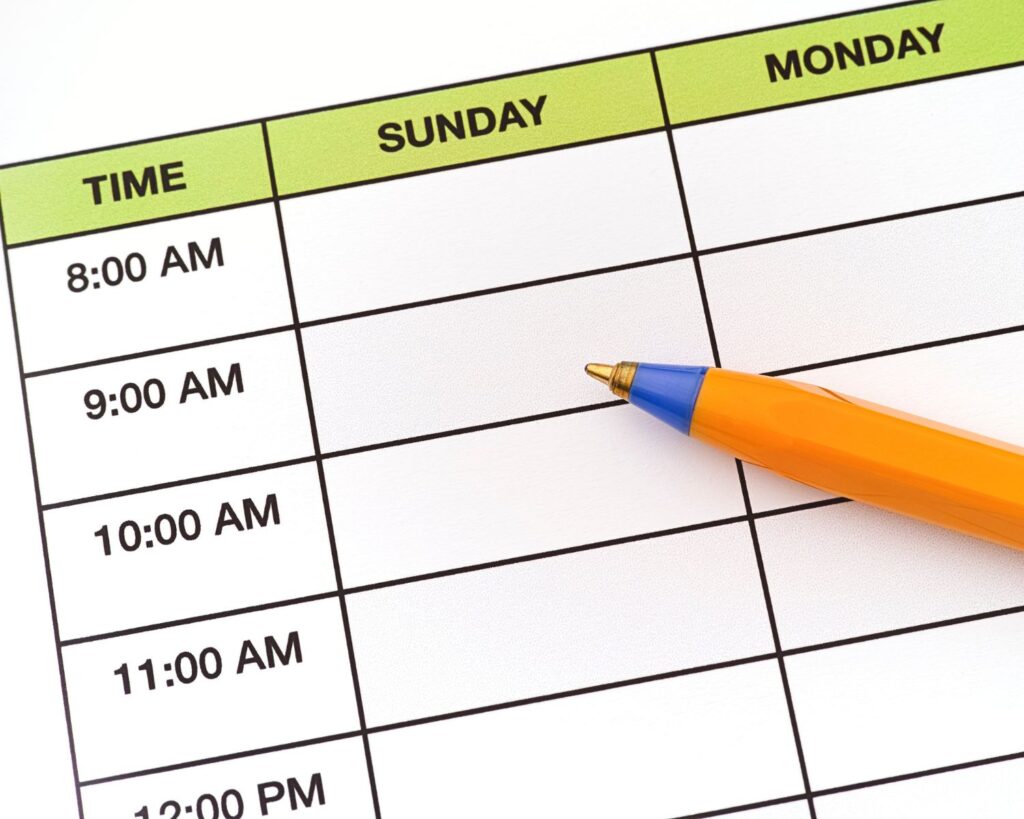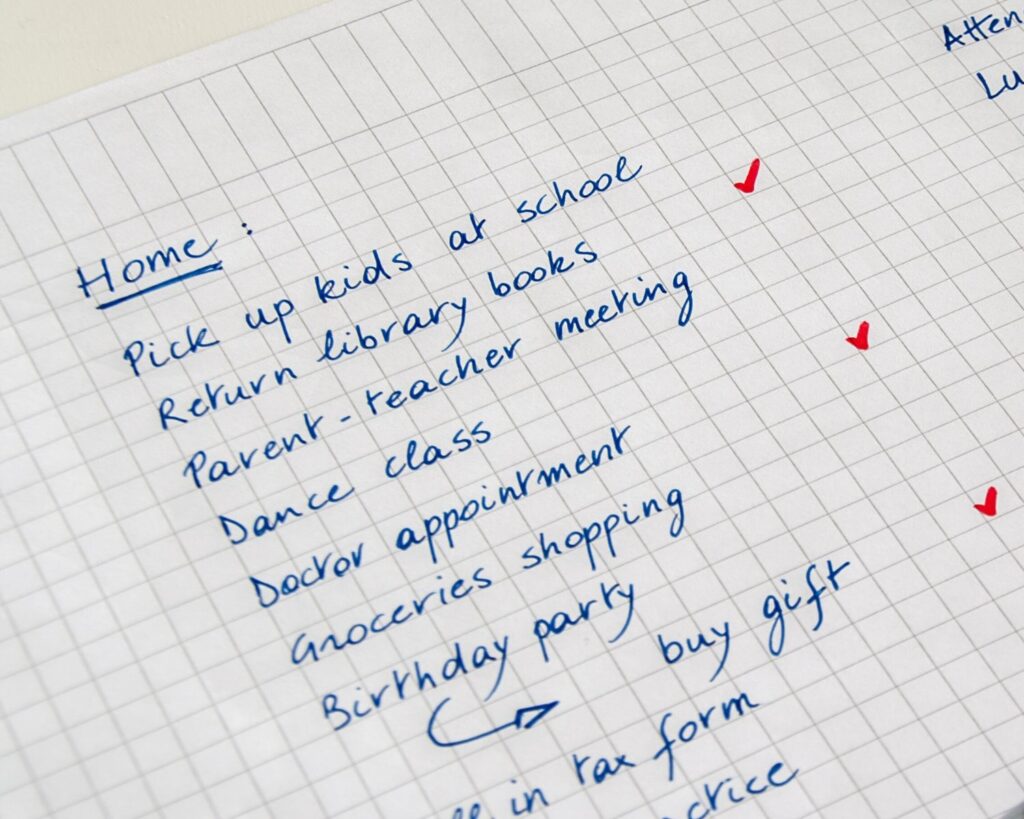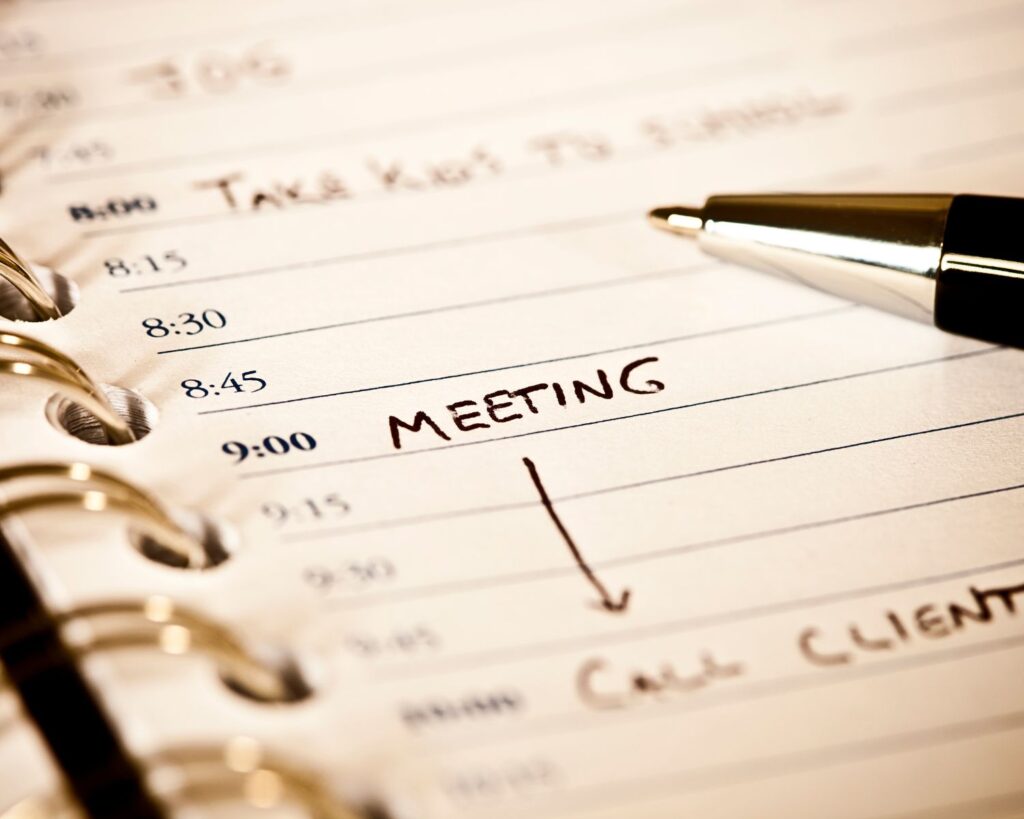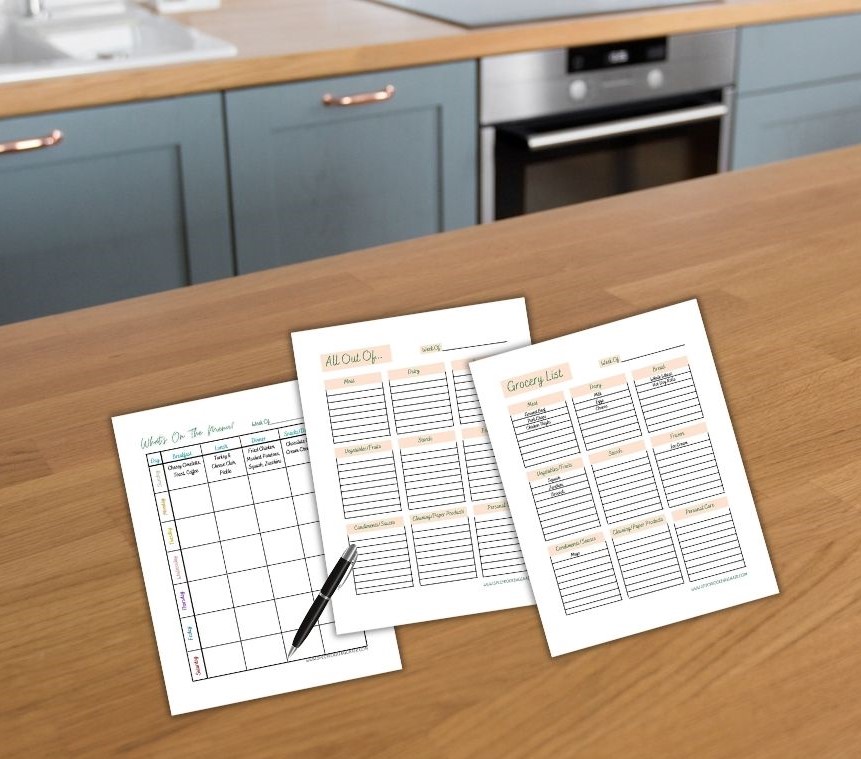
In today’s world, daily life can often feel so fast paced, you barely have time to catch your breath. It seems no matter what you do, you’re always one step behind your responsibilities or at the very best, you are just barely keeping everything under control.
That’s when you begin to feel anxious, overly stressed, and overwhelmed.
How can you possibly focus on living your best life under these circumstances?
That’s where time management for increased productivity, comes into play.
Some of the links within this post, are affiliate links. This means that, at zero cost to you, we may earn a small commission from qualifying purchases. We only recommend products or services that we have used and love. Read the full disclosure here. Thank you for your continued support!
What Does Time Management Actually Mean?

Time management just means you are organizing and implementing a system that allows you to effectively divide your time between various activities and responsibilities.
Managing your time effectively allows for more balance between work, home, family, and personal interests. This is necessary if you wish to lead a fulfilling and purposeful life.
How Is Time Management Beneficial?
There are many benefits to being able to utilize your time in an efficient manner. Not only does it help alleviate stress and anxiety, but it also promotes confidence and overall mental wellness.
When your time is managed properly, you are able to remain focused, thus accomplishing more of your goals as you wish to. It increases your energy and motivation, simply because you feel like you are in more control.
You procrastinate less, and are able to make better decisions based on all of those things. It also forces you to see what things are taking unnecessary time out of your day, and what more important things you could be getting done during those wasteful moments.
Time Management At Work

It goes without saying, work is a very significant part of our lives. Not only does it serve a financial purpose, but it allows us to grow as individuals, expanding our education and skill set. These are all important for leading a fulfilling life.
It also goes without saying, expanding that education and skill set, can sometimes lead to stress from a demanding work load. That’s when it becomes necessary to manage your time, so you can be more efficient in fulfilling your work responsibilities without burn out.
Here are just a few easy ways to manage your time at work so you can be more effective while you are there.
1. Get Organized With A Daily Schedule

Every Sunday, I create my work schedule for the upcoming week. It is broken down by day of the week, and work hours on each day.
I start with urgent tasks and plug them into the time slots and days where appropriate. From there, I add in the more flexible tasks and anything carried over from the prior week that I wasn’t able to get to.
I try to allot for ample time that I think I might need for each task. If there are additional time slots left over, I will either fill them in with secondary tasks that have been on the back burner for a while OR I might even leave one or two slots open for unexpected situations that may arise through the week.
Keeping an organized weekly/daily schedule makes everything feel a little less overwhelming.
2. Prioritize Tasks From Urgent To Minor
Admittedly, this is not always easy to do, simply because it seems everything is of an urgent manner! I tend to go with a basic rule of thumb.
When weighing out the urgency of a task, I ask myself, “What will happen if I can’t get to that thing today or this week, (or whatever the case might be)?”
If I can’t come up with any major repercussions for not getting it done immediately, then it isn’t that urgent. The things that are most time sensitive, get put to the top of the list when scheduling. The less significant things can fill in the additional spaces based on importance.
3. Group Similar Tasks Together

For example, if I have phone calls to make and emails to reply to, I might group those two tasks together. It takes care of the communication in one block of time, leaving my free time for other pressing matters.
During the hours I’m working on other responsibilities, the phone and email are put on hold. It cuts down on distractions and allows me to focus better.
The same applies to computer work. If I have more than one responsibility that relates to another, I might group them together in one time block. It just prevents me from jumping between tabs and topics.
4. Assign Time limits To Tasks
I try to be reasonable and give myself enough time to complete a task before moving onto another. That doesn’t always work out, but I tend to give myself a buffer with that time frame to allow for random circumstances.
Otherwise, if what I’m working on isn’t quite complete and can wait a bit to be completed, I will move on to another task that is on my schedule, and pick the previous one back up during one of those open time slots I have left free on my schedule.
5. Use Tools For Speeding Up Certain Tasks
Any app or computer program that can automate a task easier and more quickly, is worth seriously considering.
Calendars, planners, checklists, spreadsheets, templates, and other types of organizers are all very useful tools that can cut some work away from you, leaving you to focus on other responsibilities. It feels less overwhelming, when details are mapped out in a cohesive way.
6. Break Larger Projects Down Into Smaller Tasks
If a project is going to take hours or days to complete, divide the steps into smaller groups. Then focus on one group at a time. It makes the project feel less daunting, as well as easier to absorb and map out. It also allows you to more easily delegate to others if you need help with the project.
7. Avoid Multi-Tasking (Focus on one thing at a time)

I use to think multi-tasking was the way to go if I wanted to accomplish a bunch of things in a certain amount of time. I now see the error in my way of thinking. For me, multi-tasking lessens my focus on any one particular task, thus lacking better quality in my work.
If I focus on one thing at a time, the quality is better and I find I actually get more done due to better focus on each task.
8. Anticipate And Plan For Unexpected Situations
Because I try to over estimate the amount of time I need for the more urgent tasks, I often find myself a little ahead. If something unexpected does come up, I can be flexible and move things around a bit easier to accommodate the unexpected, without ignoring my other responsibilities.
9. Delegate/ Outsource When Necessary

This goes back to prioritizing and breaking larger projects into smaller groups. If there is something more pressing and you just can’t seem to make time for everything pressing, perhaps delegate to other team members or outsource to freelancers.
This goes for tasks you are not very familiar with, as well. There are certain things I find it much easier to outsource for, rather than spending unnecessary time trying to figure it out on my own.
10. Don’t Be A Perfectionist
I am so guilty of this, it’s unreasonable.😆 I have had to remind myself often to back away from something, if I find I’m being overly picky with the final results.
There are times when a specific task does require extra attention to detail. Then there are times when getting something done well enough, is more important than taking the extra time to perfect it.
11. Eliminate Distractions
As much as possible, at least. You can’t control everything around you, but you can remove certain things from your immediate space that cause you distraction.
For the uncontrollable things, get creative and try to find a way to keep those distractions at bay. Perhaps noise canceling headphones for noise or temporary partition of sorts for blocking out visual distractions.
12. Take Appropriate Breaks To Avoid Burn Out

“All work and no play, makes Jack a dull boy,” and a very tired boy! Taking even small breaks from your day’s work, can do a lot of good.
You may not be able to take an hour for lunch, but you can get up every hour or so to get a glass of water and distance from your work area.
This goes for overall work week schedule as well. I’m no stranger to working more than 40 hours a week, but my body will tell me when it’s time to rest. When it does, I don’t ignore it.
When you are not adequately rested, your work suffers, and you take the chance of possibly falling ill due to your body being over taxed.
Are you Liking This Post? Pin it for later!

Managing Your Time With Home

While work can be rewarding, your personal home life is what makes the rest of it all worthwhile. Your home life, of course, can also bring with it, it’s own stress.
Your work doesn’t end when you leave your job. There’s always work to be done at home too. Managing both jobs every day, is no doubt, difficult. However, just as it’s important to manage your time at work, it’s also important to manage your time at home. Feeling organized the whole day through, does wonders for your mental and emotional wellness.
Here are a few ways you can get your home space in order, as you do your work space.
1. Make A To-Do List For Home Tasks

At the same time I’m putting together my work schedule on a Sunday, I’m also putting together a to-do list for home responsibilities for the upcoming week. This might include doctor’s appointments, after school activities, or even chores that have to be done by a certain day, (laundry, ironing, etc.).
This gives me a better idea as to what my evenings will look like after work.
This is the planner I use for keeping up with home life

2. Make A Weekly Schedule
When I have a good idea as to what my personal responsibilities will look like, I will plan out a rough schedule for the evenings that week. This is just so in my after work brain fog, I don’t forget to do something important for my personal life.
If I need to scoot a couple of things around during the week, for everything to work out smoothly, I can start planning for that all at the same time.
3. Maintain Work/Life Boundaries

I know this can be difficult for some people, depending on your job and it’s demands. However, it is important to keep boundaries in place, so work doesn’t become your entire life.
Even if you really enjoy what you do, not giving yourself time for family and personal interests will eventually leave you feeling unfulfilled in a way.
Not to mention, to be successful at work, you need time to step back and observe areas of your work life that you could improve and grow from.
4. Allow Room For Unexpected Incidents
Life is never uneventful, especially when you have kids. They get sick. The car breaks down. The sink gets clogged. There will always be those moments of unexpected incidents.
The goal is to react accordingly when those things do come along, so you don’t become overwhelmed or overly stressed. Be flexible and willing to adjust, so those incidents have very little impact on your life.
5. Develop Morning And Evening Routines
In some ways, I am very much a creature of habit. I do have fairly set routines for the morning and the evening.
In the morning, I get up, grab some coffee and get breakfast together for my son. From there, I will usually take a few minutes to catch up on the internet, get dressed and go over my schedule for the day. Those things might not be in that exact order every single day, but those are the basic things that do occur every morning.
The evenings have their own routine, with dinner being within a certain frame. Chores and other responsibilities all have their own general time frame. The same goes for tv watching certain evenings and bed time.
I find keeping to overall routines, allows me to get everything accomplished without hurry or panic.
6. Look Over The Day’s Schedule Before Work

This always helps me to start my day with focus and motivation. I generally take a look at what I have happening during the work day, as well as what is on the to-do list for my personal life.
It keeps everything fresh in my mind throughout day, and less chance of me forgetting something important. I am also in a better frame of mind when I feel like my life is organized.
7. Planning Your Meals & Shopping Lists

The meal planner I use, is actually the one in my website shop. It’s just a simple bundle with everything I need to know for the week’s overall food plan.
The inventory sheet is on the fridge door through the week, so whoever uses the last of something that is a household staple of sorts, can jot down that it needs replacing.
I use the weekly planner page to map out a general idea of meals I will be serving on each day, based on what I already have in my pantry.
I then make out my shopping list using the other two for reference. It’s easy, organized, and makes my shopping trip a little easier. It also helps to curb impulsive purchases.
8. Batch Cooking For The Win
Anytime I can turn dinner into a larger batch for later use, I save time. There are certain meals we like often in this house and some of those things can be made with portions frozen for another night. It makes it easier for that future weeknight, and it’s something we all love.
Chili, soups, and casserole type meals come to mind for things I like to batch cook.
9. Tidy Up As You Go

If you regularly do small chores, you won’t be looking at a long list of tasks for your days off. I tend to wipe down kitchen counters and the stove after dish detail every night. That saves time later.
I might fold throw blankets on the sofas or fold a load of laundry while watching tv. I might wipe down the bathroom sink, or some other little 2 minute task. It just lightens the cleaning responsibilities a bit, so there’s more time for relaxation on my days off.
10. Delegate Chores
You are one person and can only stay busy so many hours in the day. If you can’t get to a chore, hand it off to someone else in the household.
You can’t do everything all the time, and if there’s something minor that just doesn’t get done, so be it!
11. Unplug And Focus On Home Responsibilities
I know, surfing the internet is a favorite way to pass time for many of us. However, think about all of the little tasks you could be getting done in that 30 minutes of internet surfing. I’m not talking major chores. I’m talking about things that take only 5 minutes, but can be wiped off of the weekend to-do list.
So, why not unplug 5-10 minutes earlier in the evening than you normally would, and utilize the time to get a little ahead.
12. Learn How To Say No
I don’t know about you, but there has been a time or two when I didn’t decline an invitation and later wish I had.
Sometimes I’m just too tired or I want personal family time instead. Sometimes I just don’t feel like peopling. There’s nothing with that, and there’s no need to feel bad.
Everyone has priorities and sometimes, yours don’t align with someone’s invite or idea.
It’s okay to say no.
13. Set Aside A Few Hours A Week For You
Maybe this is that time for you to catch up on that internet surfing. Maybe you want to read a book or do a little window shopping at a nearby store. Whatever makes you happy, as long as it is time you spend on you. Time to relax, enjoy a hobby, and unwind.
Pin this post for later!

Final Thoughts
Consistently managing your time effectively, can lead you to be more productive with a lot less effort. When your life is organized, you feel more in control, confident, and focused on your goals. It also allows you more time for yourself and your interests. By effectively managing your time, you inevitably will feel less stressed and more fulfilled in life.




